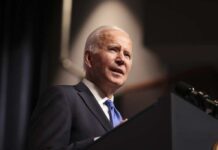
California Democrats have decided to postpone a minimum wage increase for approximately 426,000 healthcare workers as part of a broader effort to address the state’s $46.8 billion budget deficit. The delay is a result of an agreement between Governor Gavin Newsom and legislative leaders.
Originally, healthcare workers were slated to receive a wage increase on July 1, with a plan to gradually raise their pay to $25 per hour over the next decade. However, under the new proposal, the raise will be delayed until October 15, provided that California’s revenues between July and September exceed estimates by at least 3%. If this condition is not met, the wage increase will be deferred to January 1 at the latest.
This compromise preserves a significant victory for one of California’s largest labor unions, Service Employees International Union-United Healthcare Workers West (SEIU-UHW), which has been a major campaign donor for Democrats. Dave Regan, SEIU-UHW president, acknowledged the disappointment among workers but appreciated the consideration given by state leaders.
“We also recognize and appreciate that legislative leaders and the Governor listened to us as we mobilized and spoke out this year to insist that, despite a historic budget deficit, California’s patient care and healthcare workforce crisis must be addressed,” Regan said.
California’s current minimum wage stands at $16 per hour, among the highest in the nation. Fast food workers in the state already enjoy a $20 per hour minimum wage, a change implemented in April. However, raising wages for healthcare workers presents additional challenges due to its impact on the state budget, particularly since California employs some healthcare workers and funds medical benefits through Medicaid.
The Newsom administration previously estimated that the wage increase would cost the state around $2 billion. Delaying the raise until January reduces this cost to about $600 million for the state’s general fund, with annual increases projected until the hourly rate reaches $25.
Despite the recent rebound in California’s revenues, significant budget cuts are still necessary. The proposed budget agreement includes $297.9 billion in spending for the next fiscal year, beginning July 1. Among the agreed-upon cuts are $16 billion in reductions, including $110 million from a program assisting middle-class families with college expenses and $1.1 billion from various affordable housing initiatives.
However, some proposed cuts were abandoned, such as those affecting caregivers for low-income disabled immigrants on Medicaid. The budget also includes a $400 million loan to Pacific Gas & Electric to extend the life of California’s last remaining nuclear power plant, despite concerns about potential repayment issues.
Governor Newsom has also agreed to increase Medicaid payments to doctors, reversing a previous proposal to cut these funds, which had raised concerns about exacerbating the shortage of doctors willing to treat Medicaid patients. The increase in payments may be subject to change based on the outcome of a November ballot measure.
“This agreement sets the state on a path for long-term fiscal stability — addressing the current shortfall and strengthening budget resilience down the road,” Newsom stated.
The state Legislature is expected to vote on the budget this week. Republicans, who hold insufficient seats to influence the decision, criticized their exclusion from the negotiations.
Senate President Pro Tempore Mike McGuire described it as a “tough budget year” but commended the efforts to reduce the shortfall while maintaining key services and reserves. Democratic Assembly Speaker Robert Rivas emphasized the Assembly’s efforts to protect essential public services for Californians.
This budget decision underscores the complex balancing act faced by state leaders as they strive to manage a significant fiscal shortfall while addressing the needs of various stakeholders.


























